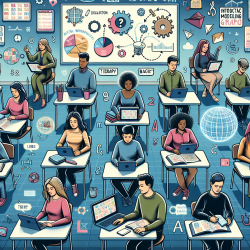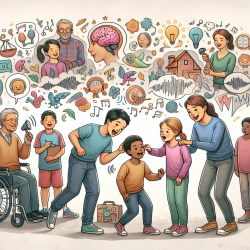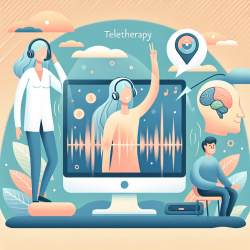In the realm of special education and speech therapy, understanding and modifying societal perceptions of stuttering remains a pivotal challenge. The study "Effect of a Videotape Documentary on High School Students' Perceptions of a High School Male Who Stutters" by McGee, Kalinowski, and Stuart offers critical insights into the complexities of changing the negative stereotypes associated with stuttering among high school students. This exploration is not just a narrative of failed stereotype modification but a call to action for practitioners to delve deeper into the intricacies of perception, education, and empathy in their approach to stuttering.
Stuttering, characterized by involuntary repetitions, prolongations, and blocks in speech, affects millions worldwide. Despite its prevalence, individuals who stutter often face pervasive negative stereotypes, impacting their social interactions, self-esteem, and opportunities. The study in question investigated the effects of the documentary "Voices to Remember" on altering high school students' perceptions of their peers who stutter.
Before viewing the documentary, participants exhibited a strong negative stereotype towards a hypothetical high school male who stutters, rating him more negatively on 11 of 25 scale items compared to a non-stuttering peer. These items reflected perceptions of being more guarded, nervous, shy, tense, and avoiding. Surprisingly, after viewing the documentary, not only did these negative stereotypes persist, but the perception of the stuttering individual as more self-derogatory, fearful, and inflexible intensified.
This outcome starkly highlights the resilience of negative stereotypes and the complexity of altering them. It prompts us to question the efficacy of singular interventions, like a documentary viewing, in changing deep-seated attitudes and biases. The findings suggest that while awareness-raising through documentaries is valuable, it cannot singularly dismantle the entrenched negative stereotypes surrounding stuttering.
For practitioners, this study underscores the importance of a multifaceted approach to stereotype modification. Engaging in further research, employing a variety of educational tools, and fostering environments of empathy and understanding are crucial steps forward. Here are several strategies practitioners can consider:
- Comprehensive Education Programs: Develop and integrate comprehensive stuttering education programs in schools that go beyond a one-time intervention. These should include interactive sessions, workshops with speech therapists, and engagement with individuals who stutter to foster understanding and empathy.
- Empathy-Building Activities: Facilitate activities that allow students to experience the challenges faced by individuals who stutter, promoting empathy and understanding. Role-playing and simulation exercises can be powerful tools in this regard.
- Community Engagement: Encourage community engagement by creating platforms for individuals who stutter to share their experiences and challenges. This can help in humanizing the condition, breaking down stereotypes, and building supportive communities.
- Continuous Research: Advocate for and participate in ongoing research to explore more effective ways of modifying perceptions and reducing stigma associated with stuttering. This includes investigating the impact of various interventions over time.
- Collaboration with Media: Collaborate with media outlets to ensure that portrayals of individuals who stutter are accurate, respectful, and free of stereotypes. Media plays a powerful role in shaping societal attitudes and can be a valuable ally in efforts to modify negative perceptions.
Transforming societal perceptions of stuttering requires persistent efforts, innovative strategies, and a commitment to understanding the nuanced experiences of individuals who stutter. The study serves as a reminder of the challenges ahead but also as a beacon guiding us towards more empathetic, informed, and inclusive approaches.
For practitioners looking to deepen their understanding and refine their approach to modifying stuttering stereotypes, the journey begins with acknowledging the complexity of the task. It's about embracing a holistic approach that combines education, empathy, community engagement, and continuous research. By doing so, we can hope to foster a society where individuals who stutter are met with understanding, respect, and opportunities to thrive.
To read the original research paper, please follow this link: Effect of a Videotape Documentary on High School Students' Perceptions of a High School Male Who Stutters.










